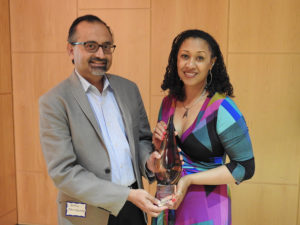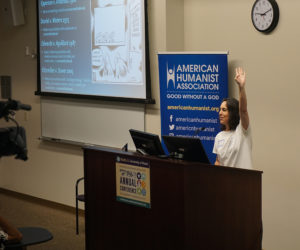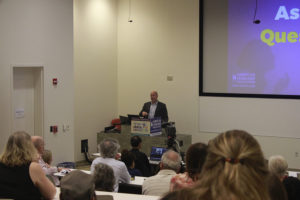AHA’s 78th Annual Conference: Expanding Our Reach, Reducing Our Footprint
 AHA President Sunil Panikkath presents the Humanist Arts Award to Leighann Lord at Medgar Evers College in Brooklyn, NY on June 8, 2019.
AHA President Sunil Panikkath presents the Humanist Arts Award to Leighann Lord at Medgar Evers College in Brooklyn, NY on June 8, 2019. Last week the American Humanist Association hosted a conference that broke new ground in a way that neither we, nor any other secular or humanist organization, had ever attempted before. Rather than offering one static conference, there were sessions offered in five cities across three days. Even more unique? The entire conference was available via livestream for free. This made the AHA’s 78th Annual Conference accessible and available to anyone and everyone who was interested.
This approach accomplished something unique, reaching more members and allowing for a wide variety of speakers to participate and educate others while building stronger networks of local humanists. Humanist communities in Los Angeles, Miami, Houston, Pittsburgh, and Brooklyn worked with the AHA to provide a strong, localized approach and bring new folks into the conference and to humanist issues.
In all, livestream and in-person, the conference attracted well over 1,000 registered attendees—close to twice the attendance at one of our traditional conferences.
Localized
The novel format of the 78th Annual Conference empowered AHA members to talk about humanism face to face in smaller groups. In order to foster stronger dialogue and action around humanistic values, it is critical that members come together and take initiative. These smaller facilitated groups contrast with what can be an overwhelming experience at a traditional conference.
Members and individuals interested in getting more involved in humanism in their neighborhood could connect with local groups they might not otherwise be aware of, strengthening those groups by adding a new, more diverse base to drive local action.

Bertha Vazquez delivers a talk on promoting evolution education at the University of Miami on June 9, 2019.
Holding the conference in five different university locations also allowed us to find great examples of how humanism has impacted our various speakers. In Pittsburgh, Andy Norman, philosophy professor and the director of the Humanism Initiative at Carnegie Mellon University, discussed the impact of the Tree of Life shooting on his neighborhood (his kids went there for day care). At the University of Miami in Florida, Bertha Vazquez, middle school science teacher and director of the Teacher Institute for Evolutionary Science, and Anjan Chakravartty, the Appignani Foundation Chair for the Study of Atheism, Humanism, and Secular Ethics at the University of Miami, connected attendees with the many resources available through the university. Not only does this show the vast experience and impact of humanism in diverse areas, but it allowed speakers to discuss humanist values from their unique specialty and geographical context.
This strong local growth was not only in the cities with an in-person AHA presence. The format of the conference allowed many of our chapters and affiliates to host watch parties in their communities. Watch parties for any event are an incredible way to bring a group together, and this was no exception. Groups gathered in California, Connecticut, Illinois, Indiana, Maryland, Missouri, North Carolina, Ohio, and Pennsylvania. Individual viewers also joined from places as widespread as Iceland, Nepal, Toronto, Alaska, Florida, Georgia, Nebraska, and West Virginia.
Technologically Savvy
Offering the livestream to all conference attendees made the experience of the conference go beyond physical place and allowed attendees to access many unique online conversations about humanism via the public chat room and Q&A section of the livestream hosted by Beacon Live.
Bruce Gleason, owner of Thumbs Up Video and the video producer for the weekend, believes this embrace of technology is invaluable to educating and informing people across the country about humanism, as well as offering a deeper dive into issues like psychology, history, and social justice.

Anthony Magnobosco delivers a conference talk at Rice University in Houston, TX on June 7, 2019.
“Streaming can reach so many more people interested in topics that interest them,” Gleason said. “The [AHA] conference used video streaming to spread the word about what humanism is about and its philosophy and inspired others from the insights of informative speakers.”
The first-of-its-kind livestream turned the conference into a three-day bonanza of humanism that also exposed a vast array of members and local humanists to learn about the AHA’s campaigns and the issues that matter to local and national secular activists.
In one exchange in the chat room during the Miami event, a user commented “Great job, folks! The various presentations that I have been able to catch have been of exceptional quality” and another returned, “Yes, thank you for the online access. I have been able to watch portions of the talk while traveling from Iceland to Los Angeles.”
Other viewers praised the opportunity to be introduced to new ideas and speakers:
- “Thanks for the talk on Camp Quest. Heard about it for years but didn’t know anything about it. Maybe the great grandchildren can get involved.”
- “Glad you picked Leighann [Lord]. I wouldn’t have known about her had you not chosen her. She is great.”
- “A terrific presentation. This is why I am a Humanist.”
Environmental
Additionally, humanists care deeply for the environment and conservation, and believe in action on climate change (some might say we’ve taken lots of initiative as of late to be HERE For Climate). By hosting locally focused conferences across the country and streaming the event directly to people’s homes and devices, our members reduced their required travel and the impact of the event on the local environment.
“While traditional conferences have the advantage of bringing folks together from different geographies to connect personally and share their diverse stories, they have the disadvantage of doing so at a high cost to participating individuals and the environment as well, since jet fuel is one of the largest carbon footprint expenditures we make,” noted AHA Executive Director Roy Speckhardt, adding that
This distributed online conference had the advantage of making the conference more accessible to those of differing financial means at a lower carbon footprint. And while there’s less connecting from coast to coast, between the handful of conference locations and the dozen-plus watch parties, there were many opportunities for individuals to meet like-minded others and discuss matters of humanism.
One livestream watcher summed it up, “Another marvelous presentation. Congratulations and thanks to AHA for conceptualizing, organizing and producing a terrific conference!”
Did you have a great conference experience? Are you eager for the next one? Start planning now for 2020, as we return to the four-day, one-location event in conjunction with the World Humanist Congress in Miami, Florida, August 6-9!
